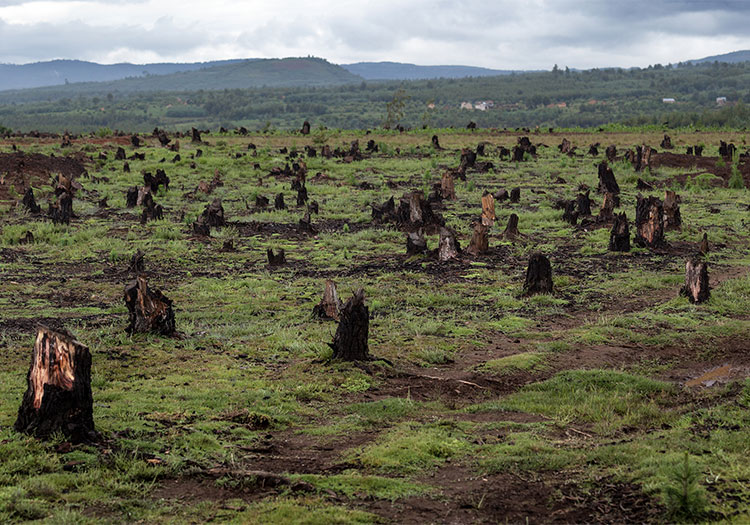
Analyzing the Main Factors Behind Biodiversity Decline and Conservation Strategies in Ethiopia: A Comprehensive Overview
Title
Analyzing the Main Factors Behind Biodiversity Decline and Conservation Strategies in Ethiopia: A Comprehensive Overview
Author
1. Lilly Omondi, Postdoctoral Researcher, Haramaya University, Ethiopia
Abstract
This research explores the
complex interplay between social and economic issues and how they affect
Ethiopia's declining biodiversity. Even though there needs to be more
theoretical arguments connecting these variables to the decline in
biodiversity, there still needs to be more empirical data. The primary causes
of the reduction in ecological diversity in this region are events caused by
humans, such as habitat destruction, the introduction of introduced organisms,
the overuse of natural resources, and the increasing popularity of monoculture
in agriculture. This study highlights the need for further research in this
area. It evaluates critically how well-existing biodiversity conservation plans
are working to protect ecosystems, species, and cultural values from these
prevailing challenges. The study comprehensively analyses the socioeconomic
factors contributing to Ethiopia's declining biodiversity, including viable
approaches, challenges, and future directions for successful intervention. It
analyses previous estimates and focuses primarily on theoretical viewpoints.
Through the support of workable conservation strategies, community-based
management, and sector-specific conservation integration across the resource
region, the research promotes the improvement of biodiversity conservation.
Keywords
Conclusion
In summary, biodiversity's role in various
sectors like agriculture, industry, and healthcare underscores its importance
beyond intrinsic value. The primary threat to this diversity is habitat loss
due to human activities such as urbanization and modern agriculture. The United
Nations Environment Programme's 2004 report highlights the alarming rate of
species extinction, linking it to socioeconomic, policy, and environmental
factors. Human-induced disturbances, including overexploitation and habitat
changes, significantly contribute to this loss. This affects ecological balance
and has profound economic and public health implications, emphasizing the
urgent need for global conservation efforts to protect our planet's
biodiversity.
Author Contrubution
The author confirms sole responsibility for the following: study conception and design, data collection, analysis and interpretation of results, and manuscript preparation.
Funding
The authors did not receive any specific grants from funding agencies in the public, commercial, or non-profit sectors for the research, authorship, and/or publication of this article.
Conflict of Interest
All authors declare that they have no conflicts of interest.
Data Sharing Statement
Not applicable
Software And Tools Use
Not applicable
Acknowledgements
I thank the following individuals for their expertise and assistance in all aspects of our study and for their help in writing the manuscript. I am also grateful for the insightful comments given by anonymous peer reviewers. Everyone's generosity and expertise have improved this study in myriad ways and saved me from many errors.
Corresponding Author
Lilly Omondi
Haramaya University, Postdoctoral Researcher, Ethiopia
Copyright
Copyright: ©2026 Corresponding Author. This is an open access article distributed under the terms of the Creative Commons Attribution License , which permits unrestricted use, distribution, and reproduction in any medium, provided the original author and source are credited.
Omondi, Lilly. “Analyzing the Main Factors Behind Biodiversity Decline and Conservation Strategies in Ethiopia: A Comprehensive Overview.” Scientific Research Journal of Environment, Earth and Physical Science, vol. 1, no. 2, 2023, pp. 19-24, https://isrdo.org/journal/SRJEEP/currentissue/analyzing-the-main-factors-behind-biodiversity-decline-and-conservation-strategies-in-ethiopia-a-comprehensive-overview
Omondi, L. (2023). Analyzing the Main Factors Behind Biodiversity Decline and Conservation Strategies in Ethiopia: A Comprehensive Overview. Scientific Research Journal of Environment, Earth and Physical Science, 1(2), 19-24. https://isrdo.org/journal/SRJEEP/currentissue/analyzing-the-main-factors-behind-biodiversity-decline-and-conservation-strategies-in-ethiopia-a-comprehensive-overview
Omondi Lilly, Analyzing the Main Factors Behind Biodiversity Decline and Conservation Strategies in Ethiopia: A Comprehensive Overview, Scientific Research Journal of Environment, Earth and Physical Science 1, no. 2(2023): 19-24, https://isrdo.org/journal/SRJEEP/currentissue/analyzing-the-main-factors-behind-biodiversity-decline-and-conservation-strategies-in-ethiopia-a-comprehensive-overview
2668
Total words1232
Unique Words124
Sentence21.153225806452
Avg Sentence Length0.33350774449565
Subjectivity0.097342128078015
PolarityText Statistics
Viewed / Downloads
Total article views: 150 (including HTML, PDF, and XML)| HTML | XML | Total | |
|---|---|---|---|
| 116 | 19 | 15 | 150 |
Viewed (geographical distribution)
Thereof 150 with geography defined and 0 with unknown origin.